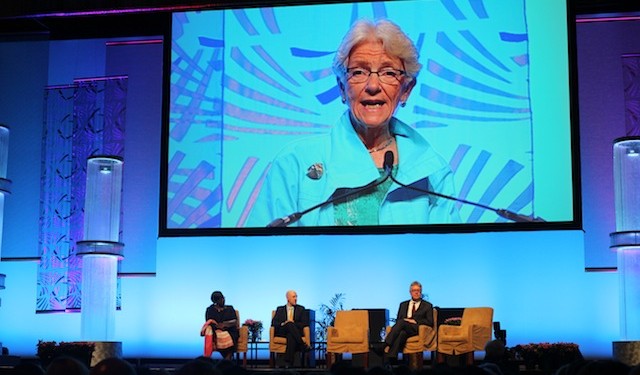As the US immigration reform bill undergoes its final mark up, international educators have raised concerns that last minute amendments could derail the country’s largest work and travel exchange scheme, the Exchange Visitor Program (EVP).
News and business analysis for Professionals in International Education
Have some pie!
US immigration bill: J-1 work-travel scheme at risk
 Marlene Johnson, NAFSA CEO, spoke on behalf of the HE sector of the importance of passing the US immigration bill in good shape at this week's NAFSA conference, St Louis, USA.
Marlene Johnson, NAFSA CEO, spoke on behalf of the HE sector of the importance of passing the US immigration bill in good shape at this week's NAFSA conference, St Louis, USA. Concerns also remain among the higher education community about provisions, although NAFSA: Association of International Educators – one of the sectors key professional bodies – told the PIE at its conference this week that it still broadly supported the bill.
Created by the US Department of State to foster international understanding, the EVP provides opportunities for educated foreign employees and students to visit the United States for on-the-job training and cultural education. Some 150,000 exchange visitors participate on J-1 visas each year.
“Without programme revenue the public-private partnership that drives the EVP programme will collapse”
However, groups including WYSE, the Alliance for International Educational and Cultural Exchange (AIECE) and Council on International Educational Exchange (CIEE) fear a range of amendments to the immigration bill could effectively kill it off if they are not removed before the bill goes to a Senate vote in June.
A major gripe concerns an amendment reclassifying EVP participants as foreign “workers” in a section of the bill aimed at tackling human trafficking. This would prohibit charging fees to EVP participants, eliminating resources to support them while in the US, and require employers who participate to post bonds with the Department of Homeland Security for the interns they hire.
“Without programme revenue, which allows the EVP to operate without appropriated funds, the public-private partnership that drives the programme will collapse,”AIECE wrote in a letter to the Senate Judiciary Committee, which is currently reviewing the bill.
It adds that “equating exchange visitors with ‘workers’ would make the programme more expensive for American families and business hosting exchange visitors”, given the fees they would have to stump up.
“Interns and trainees entering on a B visa would be placed in a completely unregulated environment”
Other bill provisions would require employers that participate in EVP to pay a $500 fee per exchange visitor, “an untenable additional expense which would shut down the program”, according to CIEE. There are also complaints that interns with multinational companies could come to the US on tourist visas “without a training plan or support of sponsors”.
“Interns and trainees entering on a B visa would be placed in a completely unregulated environment, with no structured cultural component or formal affirmation that they are not displacing American workers,” said AIECE.
Qualms persist in the higher education sector
The higher education sector continues to voice concern over amendments introduced in the last few weeks to tighten student visa monitoring in the wake of the Boston Marathon bombings (an associate of the bombers was found to have reentered the US on an expired student visa).
In a letter to the Senate Judiciary Committee on May 13, NAFSA: Association of International Educators complains about six provisions, among them a measure preventing students on student visas participating in practical training opportunities until full rollout of the long-delayed Student and Exchange Visitor Information System (SEVIS) II. Another is a proposal to delay implementing parts of immigration bill until a year after the completion of a report on intelligence and “immigration failures” leading up to the Boston attacks.
“This is a good bill. We hope it remains a good bill as it goes forward in the process”
Speaking at this week’s NAFSA conference in St Louis, USA, Vic Johnson, senior advisor for public policy, told The PIE he wanted to keep the debate about international student security on a “proper level” and condemned the sensationalised debate of recent weeks. “Foreign students are not a terrorist threat and the data shows it,” he said.
However, he said that the bill – which will among other measures will allot 5,000 more work visas for science, technology, engineering and maths graduates – was going in the right direction, and the main priority was to pass it. A petition signed by 2,000 educators calling on lawmakers to pass the bill was unveiled at the conference, too.
“This is a good bill and we hope it remains a good bill as it goes forward in the process,” Johnson said. “We are pushing the idea that we need a bill that accomplishes a path to citizenship for our undocumented people, that puts into balance the demands of our labour market with the ability of people to get visas to come in here to do the jobs in that market and all these big conjunctive that the bill seeks to accomplish,” he said.
Still looking? Find by category:



4 Responses to US immigration bill: J-1 work-travel scheme at risk